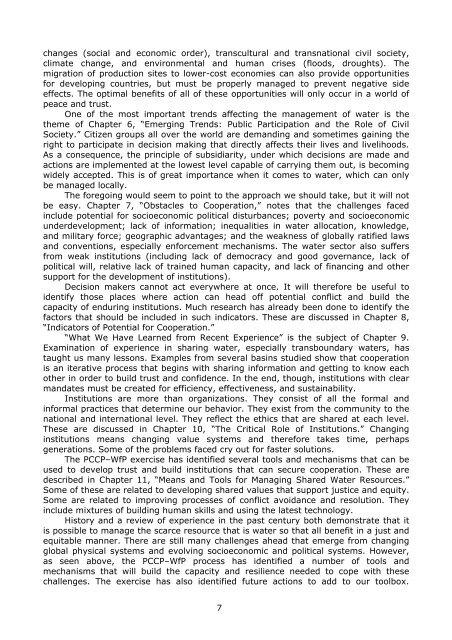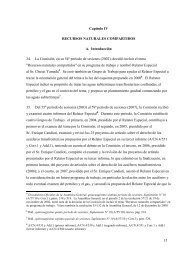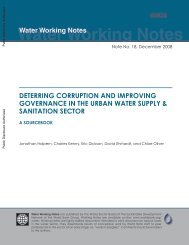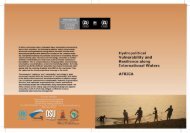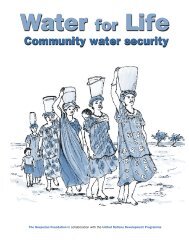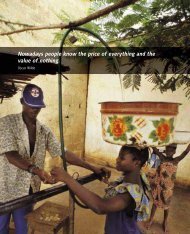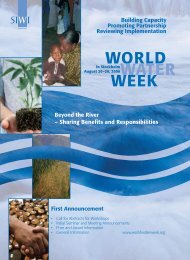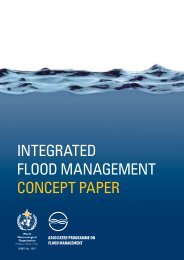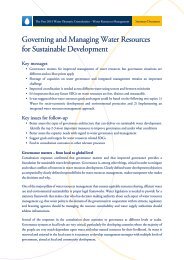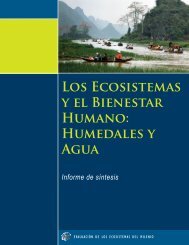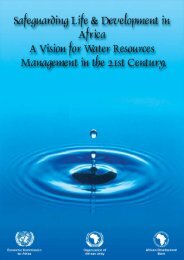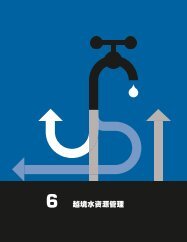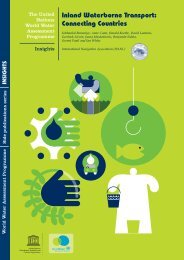Water security and peace: a synthesis of studies ... - unesdoc - Unesco
Water security and peace: a synthesis of studies ... - unesdoc - Unesco
Water security and peace: a synthesis of studies ... - unesdoc - Unesco
Create successful ePaper yourself
Turn your PDF publications into a flip-book with our unique Google optimized e-Paper software.
changes (social <strong>and</strong> economic order), transcultural <strong>and</strong> transnational civil society,<br />
climate change, <strong>and</strong> environmental <strong>and</strong> human crises (floods, droughts). The<br />
migration <strong>of</strong> production sites to lower-cost economies can also provide opportunities<br />
for developing countries, but must be properly managed to prevent negative side<br />
effects. The optimal benefits <strong>of</strong> all <strong>of</strong> these opportunities will only occur in a world <strong>of</strong><br />
<strong>peace</strong> <strong>and</strong> trust.<br />
One <strong>of</strong> the most important trends affecting the management <strong>of</strong> water is the<br />
theme <strong>of</strong> Chapter 6, “Emerging Trends: Public Participation <strong>and</strong> the Role <strong>of</strong> Civil<br />
Society.” Citizen groups all over the world are dem<strong>and</strong>ing <strong>and</strong> sometimes gaining the<br />
right to participate in decision making that directly affects their lives <strong>and</strong> livelihoods.<br />
As a consequence, the principle <strong>of</strong> subsidiarity, under which decisions are made <strong>and</strong><br />
actions are implemented at the lowest level capable <strong>of</strong> carrying them out, is becoming<br />
widely accepted. This is <strong>of</strong> great importance when it comes to water, which can only<br />
be managed locally.<br />
The foregoing would seem to point to the approach we should take, but it will not<br />
be easy. Chapter 7, “Obstacles to Cooperation,” notes that the challenges faced<br />
include potential for socioeconomic political disturbances; poverty <strong>and</strong> socioeconomic<br />
underdevelopment; lack <strong>of</strong> information; inequalities in water allocation, knowledge,<br />
<strong>and</strong> military force; geographic advantages; <strong>and</strong> the weakness <strong>of</strong> globally ratified laws<br />
<strong>and</strong> conventions, especially enforcement mechanisms. The water sector also suffers<br />
from weak institutions (including lack <strong>of</strong> democracy <strong>and</strong> good governance, lack <strong>of</strong><br />
political will, relative lack <strong>of</strong> trained human capacity, <strong>and</strong> lack <strong>of</strong> financing <strong>and</strong> other<br />
support for the development <strong>of</strong> institutions).<br />
Decision makers cannot act everywhere at once. It will therefore be useful to<br />
identify those places where action can head <strong>of</strong>f potential conflict <strong>and</strong> build the<br />
capacity <strong>of</strong> enduring institutions. Much research has already been done to identify the<br />
factors that should be included in such indicators. These are discussed in Chapter 8,<br />
“Indicators <strong>of</strong> Potential for Cooperation.”<br />
“What We Have Learned from Recent Experience” is the subject <strong>of</strong> Chapter 9.<br />
Examination <strong>of</strong> experience in sharing water, especially transboundary waters, has<br />
taught us many lessons. Examples from several basins studied show that cooperation<br />
is an iterative process that begins with sharing information <strong>and</strong> getting to know each<br />
other in order to build trust <strong>and</strong> confidence. In the end, though, institutions with clear<br />
m<strong>and</strong>ates must be created for efficiency, effectiveness, <strong>and</strong> sustainability.<br />
Institutions are more than organizations. They consist <strong>of</strong> all the formal <strong>and</strong><br />
informal practices that determine our behavior. They exist from the community to the<br />
national <strong>and</strong> international level. They reflect the ethics that are shared at each level.<br />
These are discussed in Chapter 10, “The Critical Role <strong>of</strong> Institutions.” Changing<br />
institutions means changing value systems <strong>and</strong> therefore takes time, perhaps<br />
generations. Some <strong>of</strong> the problems faced cry out for faster solutions.<br />
The PCCP–WfP exercise has identified several tools <strong>and</strong> mechanisms that can be<br />
used to develop trust <strong>and</strong> build institutions that can secure cooperation. These are<br />
described in Chapter 11, “Means <strong>and</strong> Tools for Managing Shared <strong>Water</strong> Resources.”<br />
Some <strong>of</strong> these are related to developing shared values that support justice <strong>and</strong> equity.<br />
Some are related to improving processes <strong>of</strong> conflict avoidance <strong>and</strong> resolution. They<br />
include mixtures <strong>of</strong> building human skills <strong>and</strong> using the latest technology.<br />
History <strong>and</strong> a review <strong>of</strong> experience in the past century both demonstrate that it<br />
is possible to manage the scarce resource that is water so that all benefit in a just <strong>and</strong><br />
equitable manner. There are still many challenges ahead that emerge from changing<br />
global physical systems <strong>and</strong> evolving socioeconomic <strong>and</strong> political systems. However,<br />
as seen above, the PCCP–WfP process has identified a number <strong>of</strong> tools <strong>and</strong><br />
mechanisms that will build the capacity <strong>and</strong> resilience needed to cope with these<br />
challenges. The exercise has also identified future actions to add to our toolbox.<br />
7


